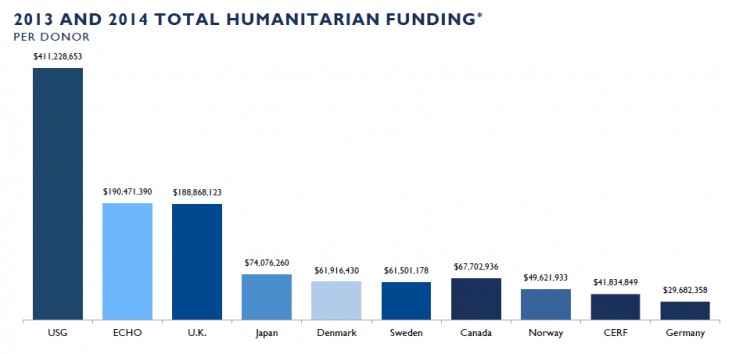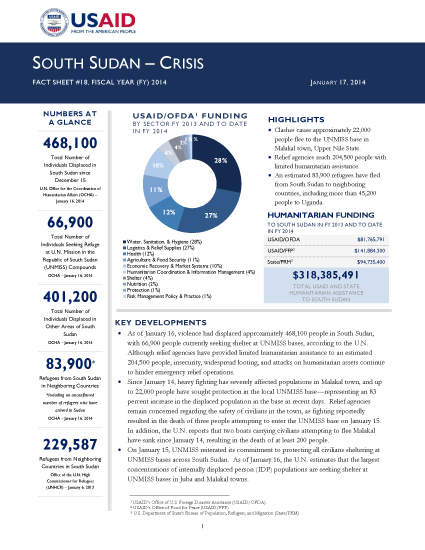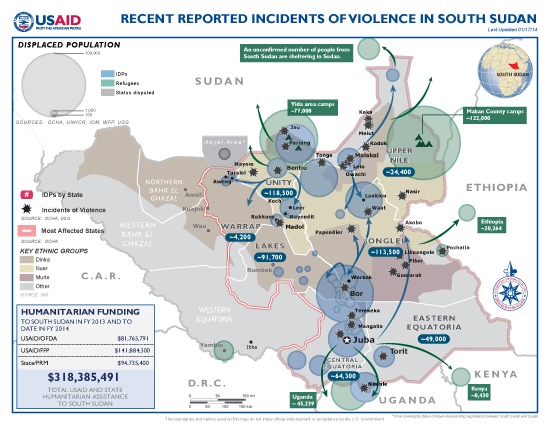- What We Do
- Agriculture and Food Security
- Democracy, Human Rights and Governance
- Economic Growth and Trade
- Education
- Environment and Global Climate Change
- Gender Equality and Women's Empowerment
- Global Health
- Humanitarian Assistance
- Transformation at USAID
- Water and Sanitation
- Working in Crises and Conflict
- U.S. Global Development Lab
Speeches Shim
January 17, 2014
Numbers At A Glance
468,100
66,900
401,200
83,900
229,587
Humanitarian Funding:
To South Sudan To Date In FY2013 and FY2014:
| USAID/OFDA | $81,765,791 |
| USAID/FFP | $141,884,300 |
| State/PRMDoD | $94,735,400 |
| TOTAL | $318,385,491 |
Highlights
Clashes cause approximately 22,000 people flee to the UNMISS base in Malakal town, Upper Nile State.
Relief agencies reach 204,500 people with limited humanitarian assistance.
An estimated 83,900 refugees have fled from South Sudan to neighboring countries, including more than 45,200 people to Uganda.
KEY DEVELOPMENTS
As of January 16, violence had displaced approximately 468,100 people in South Sudan, with 66,900 people currently seeking shelter at UNMISS bases, according to the U.N. Although relief agencies have provided limited humanitarian assistance to an estimated 204,500 people, insecurity, widespread looting, and attacks on humanitarian assets continue to hinder emergency relief operations.
Since January 14, heavy fighting has severely affected populations in Malakal town, and up to 22,000 people have sought protection in the local UNMISS base—representing an 83 percent increase in the displaced population in the base in recent days. Relief agencies remain concerned regarding the safety of civilians in the town, as fighting reportedly resulted in the death of three people attempting to enter the UNMISS base on January 15. In addition, the U.N. reports that two boats carrying civilians attempting to flee Malakal have sank since January 14, resulting in the death of at least 200 people.
On January 15, UNMISS reiterated its commitment to protecting all civilians sheltering at UNMISS bases across South Sudan. As of January 16, the U.N. estimates that the largest concentrations of internally displaced person (IDP) populations are seeking shelter at UNMISS bases in Juba and Malakal towns.
SITUATION, DISPLACEMENT, AND HUMANITARIAN NEEDS UPDATE
As sporadic fighting continues in Malakal town, relief agencies have reported the widespread looting of businesses, humanitarian compounds, and private residences in the area. The influx of approximately 10,000 additional IDPs to the UNMISS base in Malakal since January 14, which brings the total IDP population to 22,000 individuals, could severely strain the ability of humanitarian organizations to provide assistance, particularly safe drinking water, according to the U.N. Insecurity continues to prevent humanitarian flights from accessing the town and delivering additional relief supplies.
Clashes reportedly occurred in areas surrounding Bor town, Jonglei State, on January 14, and the security situation remains fluid. More than 50 wounded individuals sought emergency medical treatment in the local UNMISS base, and additional injured people arrived in Nasir town, located in Jonglei’s Akobo County, from Malakal town.
The security situation in Juba remains relatively calm but tense, according to the U.N. Relief agencies and UNMISS personnel continue efforts to protect civilians following security incidents near the Tong Ping UNMISS base that resulted in the injury of several IDPs on January 14. Despite food distributions at both Juba UNMISS bases, Tong Ping and U.N. House 3, nutrition conditions among IDPs have reportedly deteriorated, illustrating the challenge of hosting IDPs in camp-like environments where access to normal livelihoods and food sources remain limited.
The U.N. World Health Organization (WHO) released its public health risk assessment for South Sudan on January 15. Priority areas of concern currently include wounds and injuries as a direct result of violence; communicable diseases, including malaria, pneumonia, and diarrhea; risks of disease outbreak due to poor water, sanitation, and hygiene (WASH) conditions; malnutrition; and reproductive health.
According to the U.N., relief agencies have noted that humanitarian actors must develop and expand appropriate measures for assisting vulnerable populations located both in and outside UNMISS bases, including individuals living in spontaneous settlements, collective centers, and host communities. Continued insecurity and unpredictable security conditions continue to hamper humanitarian access, the provision of basic services, and the registration of populations in need of assistance.
South Sudan Crisis Fact Sheet #18 January 17, 2014 ![]() (pdf - 373k)
(pdf - 373k)
South Sudan Crisis Map #18, January 17, 2014 ![]() (pdf - 433k)
(pdf - 433k)
HUMANITARIAN RESPONSE ACTIVITIES
Although an estimated 204,500 people have received humanitarian assistance, the U.N. notes that relief agencies have not fully met needs among assisted populations due to a lack of sustained, predictable access. Humanitarian organizations have provided emergency food assistance to approximately 161,000 people, including approximately 55,000 IDPs in Awerial County, Lakes State; nearly 31,000 people in Malakal town; and more than 30,000 individuals in Juba as of January 16. USAID/OFDA partner the U.N. Humanitarian Air Service (UNHAS) is conducting regular flights to facilitate humanitarian staff movements and the delivery of emergency relief commodities across South Sudan.
Central Equatoria
To prevent further overcrowding in UNMISS bases in Juba, relief agencies continue to transfer new IDP arrivals and vulnerable individuals from Tong Ping to the less-crowded U.N. House 3, where relief agencies have registered nearly 11,900 IDPs. Although IDPs in these locations are receiving 15 liters of water per person per day, the daily arrival of approximately 400 new IDPs in Juba is straining WASH infrastructure.
In Tong Ping, which is hosting more than 18,100 IDPs, the U.N. Children’s Fund (UNICEF) is working with local non-governmental organization (NGO) Nile Hope to address drainage issues and is partnering with INTERSOS to conduct hygiene promotion activities, which will help mitigate the risk of disease outbreak. Through the International Organization of Migration (IOM)-managed Rapid Response Fund (RRF), USAID/OFDA is providing nearly $260,000 to support Nile Hope’s WASH activities in Juba, including water trucking and treatment services, waste disposal, bathing shelter and washing facility construction, and hygiene promotion training.
USAID/OFDA partner UNICEF is working to provide emergency learning spaces, education supplies, and psychosocial support to children sheltering at both UNMISS bases in Juba. Relief agencies continue to utilize systems for case management and arrange foster care for missing and unaccompanied children, and the International Rescue Committee is operating a referral center for child survivors of gender-based violence.
To facilitate sustained humanitarian operations across South Sudan, the Logistics Cluster—the coordinating body for humanitarian logistics activities, comprising U.N. agencies, NGOs, and other stakeholders—is establishing a pre-positioning hub at the Juba airport to allow for the transport of supplies by helicopters.
Eastern Equatoria
During the week of January 13, interagency teams conducted assessments in Eastern Equatoria State’s Nimule town, near the Ugandan border, following reports of displaced populations attempting to flee to Uganda. Initial findings suggest that these IDP populations are remaining in the Nimule area and do not plan to seek refuge in Uganda.
Lakes
While continuing urgent humanitarian assistance in Awerial, relief agencies conducted a rapid needs assessment on January 15 and 16, with results forthcoming. The International Committee of the Red Cross (ICRC) continues to distribute U.N. World Food Program (WFP) food commodities, reaching approximately 5,000 people per day. In addition, more than 20,300 children have received measles vaccinations.
The International Medical Corps (IMC) conducted a preliminary needs assessment in Mingkaman town, Awerial, on January 10 and found major gaps in health, psychosocial, and water, sanitation, and hygiene (WASH) services. IMC has deployed a team of eight staff to prepare an operational base in Awerial, with plans to coordinate the humanitarian response with local county representatives and local NGOs. IMC and local partners will provide medical consultations at existing health facilities and new mobile health care units in the coming days.
Population movements remain fluid in Awerial as new IDPs continue to arrive and other populations depart the area, reportedly creating distribution and registration challenges. UNICEF notes that the relocation of Awerial IDPs to other areas of Lakes is imminent due to overcrowding. European Commission’s Directorate-General for Humanitarian Aid and Civil Protection (ECHO) reports that the cost for river transport across from Jonglei to Lakes has risen to approximately $50, representing a 67 percent increase from $30 since early January.
In Awerial, UNICEF is working with the Lakes State Government to construct latrines for approximately 84,000 IDPs. While relief agencies have built 50 latrines to date, an excavator will expedite the latrine construction process to a goal target of 50 latrines per day.
Jonglei
On January 16, USAID/OFDA partner UNHAS conducted three helicopter flights to Bor town, Jonglei, marking the first UNHAS transport of humanitarian staff and commodities—including high-energy biscuits and WASH supplies—to Bor since hostilities.
OCHA and UNMISS transported approximately 100 metric tons (MT) of food commodities from the WFP warehouse in Bor to the UNMISS base on January 13, and USAID/FFP partner WFP provided 16-day food rations to approximately 9,000 people.
UNICEF and International Aid Services have constructed 50 latrines at the UNMISS Bor base. Relief agencies are continuing hygiene promotion activities and have distributed WASH relief items—including soap, water treatment products, and buckets—to IDPs.
An interagency team assessed humanitarian conditions in Lankien town, Nyirol County, Jonglei, where significant influxes of IDPs have reportedly arrived in recent days. Preliminary assessment results indicate that displaced households fled fighting in Malakal and have family members or other connections to Lankien, suggesting the IDPs have largely integrated into host communities or dispersed in neighboring areas.
Upper Nile
IOM and UNICEF have increased staffing presence at the UNMISS IDP site in Malakal and have established a system to identify and register separated and unaccompanied children. To address additional child protection needs, relief agencies have pre-positioned emergency child protection supplies—including child development kits, sleeping mats, and plastic sheets—for child-friendly spaces in the camp.
Unity
Despite sporadic clashes that occurred in Bentiu town, Unity State, on January 16, security conditions have stabilized. Humanitarian organizations are airlifting emergency relief supplies, including high-energy biscuits, and a mobile storage unit that will facilitate the pre-positioning of commodities in the local UNMISS base prior to distributions. Although the provision of safe drinking water and sanitation conditions remain below international standards, relief agencies will bolster WASH response efforts in the coming days. The number of IDPs sheltering in the UNMISS base in Bentiu continues to decrease, with approximately 5,300 people remaining in the compound as of January 16.
ICRC has installed water supply equipment, and current safe drinking water supply to IDPs at the base has reached 15 liters of water per day as of January 15. A WASH team plans to deploy to Bentiu in the coming weeks in order to improve sanitation conditions at the base.
In response to health needs, IOM reports that it plans to establish a health clinic at the Bentiu IDP site, staffed by medical personnel from across South Sudan. Relief agencies have pre-positioned medical supplies and tents and plan to send these items to Bentiu in the coming days.
Relief agencies remain concerned by civilian protection conditions at the UNMISS IDP site in Bentiu. UNICEF reports that many IDPs feel insecure inside the base and that there is a continued risk of familial and inter-communal violence. Women in the camp have reported incidences of gender-based and sexual violence by armed forces.
OTHER HUMANITARIAN ASSISTANCE
To address expanding camp management needs, USAID/OFDA partner IOM has deployed 28 staff to South Sudan in recent days, increasing IOM’s presence to 44 total personnel. Since fighting began on December 15, USAID/OFDA has awarded more than $2 million through the IOM-managed Rapid Response Fund (RRF), with partners focusing on camp coordination and management, health, protection, relief item, shelter, and water, sanitation, and hygiene (WASH) needs among IDPs.
USAID/FFP partner the U.N. World Food Program (WFP) completed 30-day food ration distributions in Bor town, Jonglei State, reaching all 9,000 IDPs located in the UNMISS compound.

2013 TOTAL HUMANITARIAN FUNDING*
*Funding figures are as of January 17, 2014. All international figures are according to OCHA’s Financial Tracking Service (FTS) and based on international commitments during the 2013 and 2014 calendar years. USG figures are according to the USG and reflect the most recent USG commitments based on the 2013 fiscal year, which began on October 1, 2012, and ended September 30, 2013, as well as the 2014 fiscal year, which began on October 1, 2013.



Comment
Make a general inquiry or suggest an improvement.